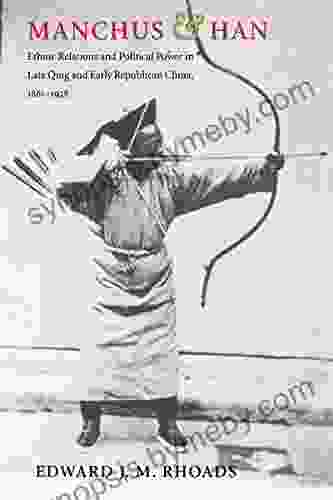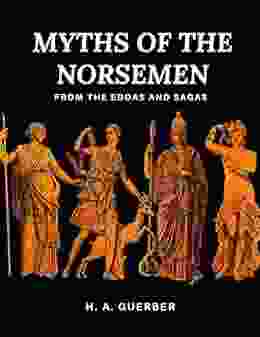Ethnic Relations And Political Power In Late Qing And Early Republican China

The late Qing dynasty and early Republican period in China witnessed significant shifts in ethnic relations and political power dynamics. This era marked the end of centuries-long Manchu rule and the rise of a new Chinese republic. This article delves into the intricate relationship between ethnicity and power during this transformative period, shedding light on the complex interplay of cultural, political, and social forces.
4.7 out of 5
| Language | : | English |
| File size | : | 5632 KB |
| Text-to-Speech | : | Enabled |
| Screen Reader | : | Supported |
| Enhanced typesetting | : | Enabled |
| Print length | : | 414 pages |
Manchu Rule and Ethnic Tensions
The Manchus, an ethnic minority from beyond the Great Wall, established the Qing dynasty in the 17th century. Their rule ushered in a period of relative peace and prosperity but also sowed the seeds of ethnic tensions. Manchu rulers implemented policies that favored their own ethnic group, leading to resentment among the Han Chinese majority and other ethnic minorities.
One of the most contentious issues was the "banner system," which segregated society into hereditary military units based on ethnicity. The Manchus dominated the most powerful banners, while Han Chinese and other minorities were relegated to lesser positions. This system perpetuated social divisions and hindered the integration of different ethnic groups.
Nationalist Movement and Ethnic Identity
In the late 19th century, a wave of nationalism swept across China, fueled by growing discontent with foreign imperialism and the Qing government's inability to protect its people. This movement awakened a sense of ethnic identity among Han Chinese and other minorities, leading to challenges to Manchu rule.
Revolutionary leaders, such as Sun Yat-sen, advocated for a new China based on the principles of nationalism, democracy, and equality. They sought to forge a unified Chinese nation that transcended ethnic divisions. However, the question of how to balance ethnic autonomy with national unity remained a contentious issue.
Republican Revolution and Ethnic Minorities
The Xinhai Revolution of 1911 brought an end to the Qing dynasty and the establishment of the Republic of China. The new republic faced the daunting task of integrating diverse ethnic groups into a single nation-state.
Initially, the Republican government attempted to appease ethnic minorities through policies of autonomy and self-determination. However, these policies proved difficult to implement in practice, and tensions between the Han Chinese central government and ethnic minority regions persisted.
The Republican period saw the rise of ethnic minority leaders who sought to safeguard their people's rights and cultural heritage. Figures such as Inner Mongolian Prince De Wang and Yunnan Hui leader Ma Fuxiang played significant roles in mediating between the government and their respective ethnic communities.
Power Struggles and Ethnic Conflict
The early Republican period was marked by widespread political instability and power struggles among different factions. Ethnic rivalry often intersected with these power dynamics, further complicating the political landscape.
Warlordism, a period of regional military rule, emerged in the aftermath of the Xinhai Revolution. Many warlords exploited ethnic divisions to consolidate their power. In some cases, they instigated conflicts between ethnic groups to weaken their rivals.
The Japanese invasion of Manchuria in the 1930s further exacerbated ethnic tensions. The Japanese army recruited ethnic minorities to collaborate with them, creating deep divisions between them and the Chinese resistance.
The late Qing and early Republican period in China was a time of profound change and upheaval, characterized by complex ethnic relations and power dynamics. The end of Manchu rule and the rise of the Republic of China brought new challenges and opportunities for ethnic minorities, who sought to navigate the complexities of a rapidly evolving political landscape.
The interplay of ethnicity and power during this period shaped the course of Chinese history and continues to resonate in contemporary discussions on ethnic relations and nation-building. Understanding this intricate relationship is crucial for comprehending the complexities of China's past and present.
4.7 out of 5
| Language | : | English |
| File size | : | 5632 KB |
| Text-to-Speech | : | Enabled |
| Screen Reader | : | Supported |
| Enhanced typesetting | : | Enabled |
| Print length | : | 414 pages |
Do you want to contribute by writing guest posts on this blog?
Please contact us and send us a resume of previous articles that you have written.
 Book
Book Novel
Novel Page
Page Chapter
Chapter Text
Text Story
Story Genre
Genre Reader
Reader Library
Library Paperback
Paperback E-book
E-book Magazine
Magazine Newspaper
Newspaper Paragraph
Paragraph Sentence
Sentence Bookmark
Bookmark Shelf
Shelf Glossary
Glossary Bibliography
Bibliography Foreword
Foreword Preface
Preface Synopsis
Synopsis Annotation
Annotation Footnote
Footnote Manuscript
Manuscript Scroll
Scroll Codex
Codex Tome
Tome Bestseller
Bestseller Classics
Classics Library card
Library card Narrative
Narrative Biography
Biography Autobiography
Autobiography Memoir
Memoir Reference
Reference Encyclopedia
Encyclopedia Dr Marilyn Glenville Phd
Dr Marilyn Glenville Phd E Cheng
E Cheng Edmund S Wong
Edmund S Wong Frank Mattes
Frank Mattes Jason Christopher Hartley
Jason Christopher Hartley Dr Adrienne T Hunter
Dr Adrienne T Hunter Springer Publishing Company
Springer Publishing Company Eerie Von
Eerie Von E J Wade
E J Wade Paul Goble
Paul Goble Doug Stanton
Doug Stanton Kanoe Kaye
Kanoe Kaye Stephanie Walls
Stephanie Walls Dreamstorm Publications
Dreamstorm Publications Tim Wise
Tim Wise Edward Lee Rocha
Edward Lee Rocha Robin D G Kelley
Robin D G Kelley Steve Roper
Steve Roper Kaden James
Kaden James Duncan Steel
Duncan Steel
Light bulbAdvertise smarter! Our strategic ad space ensures maximum exposure. Reserve your spot today!

 Gabriel Garcia MarquezHope, Help, and a Wake-Up Call: A Comprehensive Guide for Parents of Children...
Gabriel Garcia MarquezHope, Help, and a Wake-Up Call: A Comprehensive Guide for Parents of Children...
 Herman MitchellForecasting and Assessing Risk of Individual Electricity Peaks: Unveiling the...
Herman MitchellForecasting and Assessing Risk of Individual Electricity Peaks: Unveiling the... Ricky BellFollow ·19.6k
Ricky BellFollow ·19.6k Melvin BlairFollow ·5.4k
Melvin BlairFollow ·5.4k Dakota PowellFollow ·6k
Dakota PowellFollow ·6k Benjamin StoneFollow ·16.9k
Benjamin StoneFollow ·16.9k Wayne CarterFollow ·9.2k
Wayne CarterFollow ·9.2k Chadwick PowellFollow ·6.5k
Chadwick PowellFollow ·6.5k Jett PowellFollow ·10.1k
Jett PowellFollow ·10.1k Darrell PowellFollow ·11.9k
Darrell PowellFollow ·11.9k

 Colton Carter
Colton CarterEmperor of the Sea Charlotte Linlin:
A Monumental Force...

 Brett Simmons
Brett SimmonsIgnite Intimacy and Bridge Miles: 401 Discussion...
Long distance relationships (LDRs),while...

 Manuel Butler
Manuel ButlerEscape into the Extraordinary World of "Dressrosa:...
Unveiling the...

 Stuart Blair
Stuart BlairUnlock the Secrets to Enhance Your Fertile Egg Quality: A...
For couples longing to start...

 Ismael Hayes
Ismael HayesOperation Dressrosa: The One Piece Graphic Novel – Gear...
Are you ready to set sail on...
4.7 out of 5
| Language | : | English |
| File size | : | 5632 KB |
| Text-to-Speech | : | Enabled |
| Screen Reader | : | Supported |
| Enhanced typesetting | : | Enabled |
| Print length | : | 414 pages |










